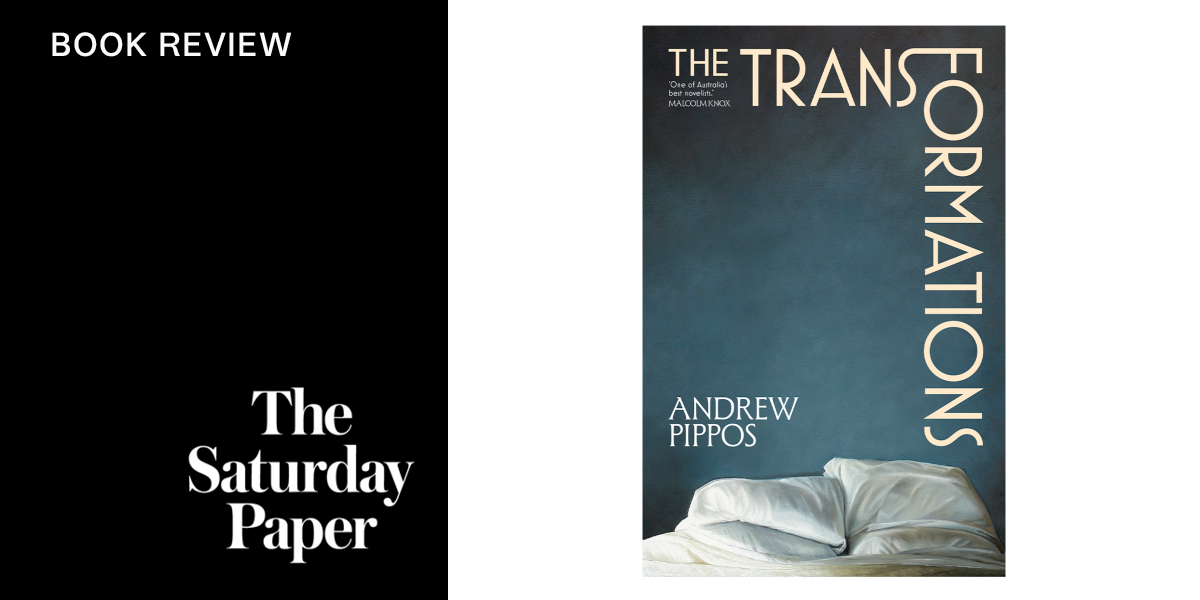As Andrew Pippos’s second novel opens, it’s 2014. In the offices of his fictional newspaper, The National, two journalists are leaving. The first is a four-decade veteran who claims that despite the state of the industry being “worse than he ever imagined”, he’s leaving “on his own terms”. It’s a claim his colleagues, experts at parsing gradations of meaning, are quick to observe leaves open the question of whether he is sick of working nights or whether he has chosen to accept the redundancy package presented to him in the latest round of lay-offs. The second has decided to look for a new job after realising that from where she sits in the newsroom she can see not only her former husband but also his new wife and her current boyfriend. Her advice to young reporters? “Don’t get involved with other journalists.”
These two threads – the ongoing collapse of the news media and the sometimes shocking ways that the certainties of relationships shift and change – form the spine of The Transformations. At the book’s centre is George Desoulis. Born and raised in Goulburn, where – in an echo of Pippos’s justly acclaimed debut, Lucky’s – his Greek migrant parents ran a cafe, George now works as a subeditor at The National.
Whether George actually likes his job is an open question: although he finds it intellectually satisfying, its real attraction seems to be that it allows him to avoid the entanglements of intimacy. He rises at “the crack of noon”, heads into the office, works, then returns to his studio apartment about midnight to spend a few hours unwinding from the day, alone.
This isolation is deliberate, a manifestation of what George sees as his “avoidant … character … He’d rather not enquire why he didn’t get a job he interviewed for, or why he and a friend drifted apart, or why his sister called him once a year … there were infinite painful explanations he could live without, or at least defer.”
George understands this passivity and desire to close himself off from the world is rooted in the fact he was abused by one of the priests who taught at his school. But while he tells himself he has “settled the matter in therapy”, the fact that aside from his former therapist he has never told anybody – not his now-dead parents, not his sister, not friends or girlfriends – suggests otherwise.
George’s carefully maintained equilibrium is disturbed when he finds himself drawn into a relationship with Cassandra Gwan, a reporter at The National. Like George, Cassandra is the children of migrants: in her case an Italian–Australian mother and a Korean father. Cassandra is highly respected both professionally and personally, and with good reason: in one sequence she helps a flailing cadet carry out a visit to the relatives of a young man killed riding a delivery bike, a process that leaves her feeling like it is a mistake to “play big sister” while doing it anyway.
George and Cassandra’s relationship is not adulterous, at least at first, because she and her husband, Nico, have an open marriage. But as their feelings for each other deepen, this arrangement becomes less easy to sustain, especially for George. Meanwhile, George’s isolation is placed under further pressure by the return of his daughter, Elektra, from Melbourne. Elektra was conceived accidentally when George and her mother, Madeleine, were students, and for most of her life George has been a bit player, deliberately pushed to the margins by Madeleine and her parents. Now a teenager, Elektra wants to move in with George in order to get away
from Madeleine and her new husband and their baby.
As in Lucky’s, Pippos writes with real sophistication about the complex legacies of growing up as the child of migrants, how their dislocation echoes across generations – the unknowability of parents, and in particular migrant parents, is a subject the novel returns to frequently. But it is George’s abuse that is the true emotional substrate of The Transformations. Although its perspective shifts between George, Cassandra and Nico, the book has the numbed, dissociative texture of trauma. George’s reactions are often puzzlingly muted – at one point he learns he may lose his job at the end of the day and simply goes back to work as if nothing has happened. In this, it shares something with Julian Barnes’ The Only Story and Ian McEwan’s Lessons – both books in which the shapelessness and impossibility of naming what has been taken suffuse everything.
Around this the novel threads a larger story about the decline of the newspaper industry. Pippos writes with great assurance about the business of producing a newspaper and the “laboratories of gossip” of newsrooms. He is also clear-eyed about the larger social cost of the collapse of traditional media and the delusions of many who presided over that collapse: the book saves particular contempt for the Lattimore family who own The National, the ageing patriarch of which indulges fantasies of a time when the disruption will end and readers will return, even as the younger generation eye the bottom line and plot escape strategies.
Ultimately, The Transformations is a book about love and its capacity to transfigure and remake us. For Cassandra that means accepting she cannot please everybody. For George it means recognising the cost of not allowing himself to live fully, to feel anger and pain, to be at risk. Or as he realises in one of this powerful and deeply absorbing novel’s most moving moments, “for a long time, and with a great deal of effort, he’d tried to live without turbulence, without much at stake. But that was not a real life. It was a vow of poverty.”
Picador, 352pp, $34.99
This article was first published in the print edition of The Saturday Paper on
October 18, 2025 as “The Transformations”.
For almost a decade, The Saturday Paper has published Australia’s leading writers and thinkers.
We have pursued stories that are ignored elsewhere, covering them with sensitivity and depth.
We have done this on refugee policy, on government integrity, on robo-debt, on aged care,
on climate change, on the pandemic.
All our journalism is fiercely independent. It relies on the support of readers.
By subscribing to The Saturday Paper, you are ensuring that we can continue to produce essential,
issue-defining coverage, to dig out stories that take time, to doggedly hold to account
politicians and the political class.
There are very few titles that have the freedom and the space to produce journalism like this.
In a country with a concentration of media ownership unlike anything else in the world,
it is vitally important. Your subscription helps make it possible.

Purchase this book
The Transformations
When you purchase a book through this link, Schwartz Media earns a commission.
This commission does not influence our criticism, which is entirely independent.
Send this article to a friend for free.
Share this subscriber exclusive article with a friend or family member using share credits.
Used 1 of … credits
use share credits to share this article with friend or family.
You’ve shared all of your credits for this month. They will refresh on November 1. If you would like to share more, you can buy a gift subscription for a friend.
SHARE WITH A FRIEND
? CREDITS REMAIN
SHARE WITH A SUBSCRIBER
UNLIMITED
Loading…


